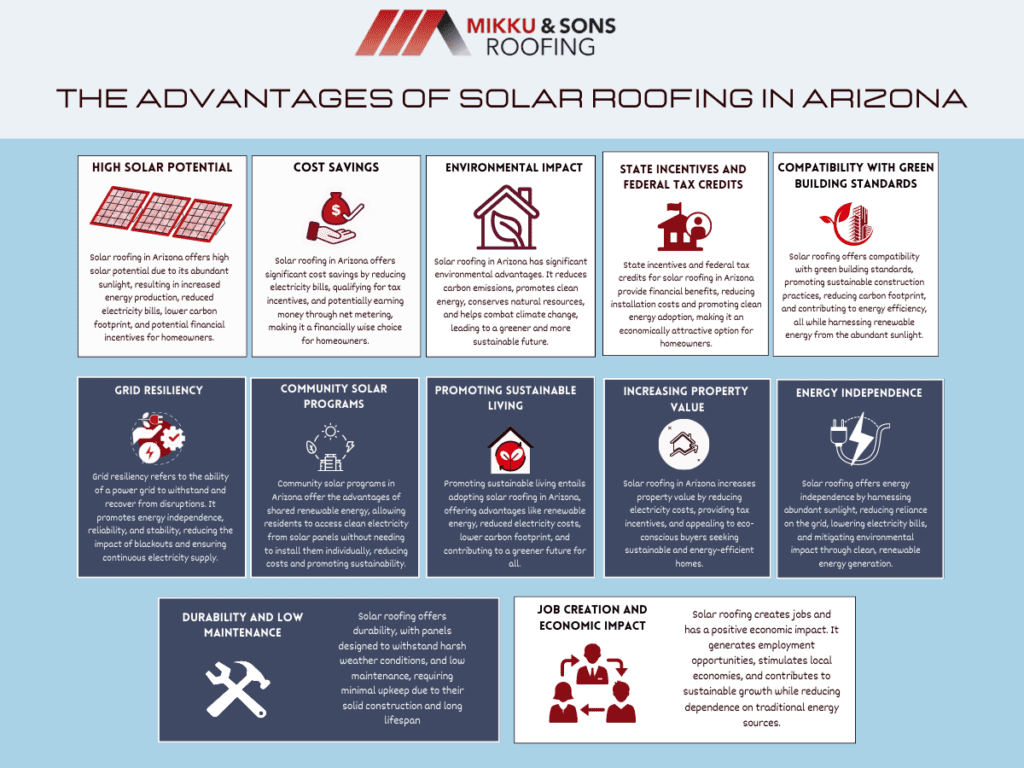

What are the advantages of solar roofing in Arizona? Arizona, one of the sunniest states in the U.S., offers immense potential for harnessing solar power. Solar roofing, an innovative and aesthetic solution, is leading Arizona's transition to green energy. Taking full advantage of the state's abundant sunshine, it promises many benefits beyond environmental sustainability.
With its favorable geographical positioning and climate, solar roofing holds substantial promise for Arizonian homeowners and businesses. This article will delve into the multiple advantages of adopting solar roofing in Arizona, discussing aspects such as cost savings, environmental impact, increasing property value, and more.
Before exploring the benefits, it's essential to understand what solar roofing is. Solar roofs, often referred to as solar shingles or tiles, are roofing materials that incorporate solar photovoltaic (PV) technology. They capture sunlight and convert it into electricity for use in your home.
These innovative products blend the functionality of a traditional roof with the capability to generate renewable energy, thereby serving dual purposes - protecting your home and powering it.
Arizona is often referred to as the "sunniest state" in the U.S. With Phoenix, the state's capital, boasting an impressive 299 sunny days a year, the potential for harnessing solar power is tremendous.
The first and perhaps most significant advantage of solar roofing in Arizona lies in the state's abundant sunshine. Solar panels rely on sunlight to generate electricity, and more sunlight translates to higher energy production. The more energy your solar roof can produce, the less electricity you need to draw from the grid, leading to considerable savings on your utility bills.
A significant advantage of solar roofing is the potential for substantial cost savings. While the upfront costs of solar roofing can be higher than traditional roofing materials, the long-term savings typically more than offset the initial expenditure.
Solar roofs can significantly cut down on electricity bills in Arizona, where air conditioning usage is high due to the hot climate. Since solar panels can last up to 25-30 years, homeowners are looking at decades of reduced electricity costs.
Solar energy is a clean, renewable resource, unlike fossil fuels, which are finite and contribute to climate change. You significantly reduce your home's carbon footprint by installing a solar roof. Over its lifetime, a residential solar power system can offset the carbon dioxide equivalent of driving a car for 100,000 miles or more.
Furthermore, unlike other energy sources, solar energy doesn't require water to process, making it a great option for Arizona, where water resources can be scarce.
Homes equipped with solar power systems have been found to sell at a premium compared to homes without such systems. A study conducted by the Lawrence Berkeley National Laboratory concluded that homes with solar panels sell for more than those without. Given the sunny climate in Arizona, a solar roof can significantly increase the market value of your home.

With a solar roofing system, you are less dependent on the grid. This autonomy can be particularly advantageous during power outages or periods of high electricity demand when utility companies often increase rates.
Additionally, Arizona's net metering policies allow homeowners to sell any excess electricity their solar system generates back to the grid. This setup can lead to further savings or even potential income, adding another financial incentive for solar power.
Solar roofs have proven to be incredibly durable and require minimal maintenance. They are designed to withstand harsh weather conditions, including the high temperatures and heavy monsoon rains that Arizona can experience. Most solar roofing systems come with lengthy warranties, often up to 25 years, providing homeowners with peace of mind.
Regular cleaning and an annual inspection are usually all that's needed to keep a solar roof in good condition. This low maintenance adds to the overall cost-effectiveness of the system over its lifespan.
Solar roofs, especially those paired with a battery storage system, contribute to grid resiliency. They can store excess power generated during the day for use during the night or cloudy periods.
In the event of a blackout or grid failure, homes with stored solar power can still have access to electricity. This feature can be especially beneficial in Arizona, where summer storms can sometimes disrupt the power supply.
Community solar programs offer an alternative for homeowners who may not have suitable roofs for solar installation or live in apartments. These programs allow multiple people to benefit from a single, shared solar array, which can be installed on a suitable site within the community. Arizona has several such programs, expanding the accessibility of solar power to more residents.
On a more personal level, installing a solar roof promotes a sustainable lifestyle. It allows homeowners to actively participate in the fight against climate change by reducing reliance on fossil fuels. It's a clear statement of environmental responsibility and commitment to the future of our planet.
Arizona offers several incentives for homeowners to switch to solar energy. These include property and sales tax exemptions, making the upfront cost of solar installation more affordable.
The Arizona Public Service (APS) and Tucson Electric Power (TEP) also provide incentives for customers who install solar power systems. Moreover, the federal government offers a significant solar Investment Tax Credit (ITC), which allows homeowners to deduct a portion of their solar costs from their taxes.
Solar roofs can help a building meet green building standards such as LEED (Leadership in Energy and Environmental Design). These certifications can enhance a property's value and appeal. In Arizona, where sustainable building practices are becoming more popular, a solar roof can significantly contribute to a building's green credentials.
The solar industry has also contributed positively to Arizona's economy. The rise in solar installations has increased job opportunities for solar installers, electricians, and manufacturers. According to the Solar Foundation, the solar industry has created thousands of jobs in Arizona, stimulating the local economy.
The advantages of solar roofing in Arizona are multifaceted, ranging from significant cost savings and environmental benefits to property value enhancement and energy independence.
With abundant sunshine, attractive incentives, and the potential for significant long-term savings, there's no better time than now for homeowners in Arizona to consider solar roofing as a viable, sustainable option for their homes.
